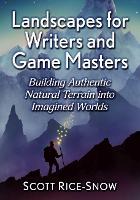


|
|
|
books
| book details |
Landscapes for Writers and Game Masters: Building Authentic Natural Terrain into Imagined Worlds
By (author) Scott Rice-Snow

|
This book is currently unavailable. Enquire to check if we can source a used copy
|
| book description |
Landscape science tells fascinating stories, whether in fiction or a role-playing game. Earth's varied terrain provides many examples of scene-specific challenges and resources for story characters, with distinctive land features, compelling locations, and intriguing traits. Landslides, floods, coastal erosion, glacier movement, and volcanism can deliver fresh plot points and alter the social character of an imagined region. Characters traveling different river types encounter very different puzzles, opportunities, and combat environments and the same variety awaits within other classic settings, such as caves, mountains, deserts, shorelines, and volcanic zones. Atypical landscapes such as tundra, karst, and vast glacier surfaces can breathe fresh air into any stories. This handbook is a reference source for creative writing and game world building. It delves deeply into many landscape characteristics that help set the tone, shape character behavior, and drive the plot. Chapters are divided into diverse geographic environments, from rivers and shorelines to caves and volcanoes, and show how knowledge of the terrain can deliver plot points, add veracity, pose key problems, establish conflict, and lead into the next scene. Discover how authors and game masters effectively weave land and terrain into their stories.
| product details |
Normally shipped |
Publisher | McFarland & Co Inc
Published date | 4 May 2022
Language |
Format | Paperback / softback
Pages | 250
Dimensions | 254 x 178 x 13mm (L x W x H)
Weight | 454g
ISBN | 978-1-4766-8357-7
Readership Age |
BISAC | games / role playing & fantasy
| other options |
|
|
|
To view the items in your trolley please sign in.
| sign in |
|
|
|
| specials |
|
This first comprehensive biography of Cecil Rhodes in a generation illuminates Rhodes’s vision for the expansion of imperialism in southern Africa, connecting politics and industry to internal development, and examines how this fueled a lasting, white-dominated colonial society.
|
|
|
Let's stare the future down and, instead of fearing AI, become solutionists.
|
|
|
|